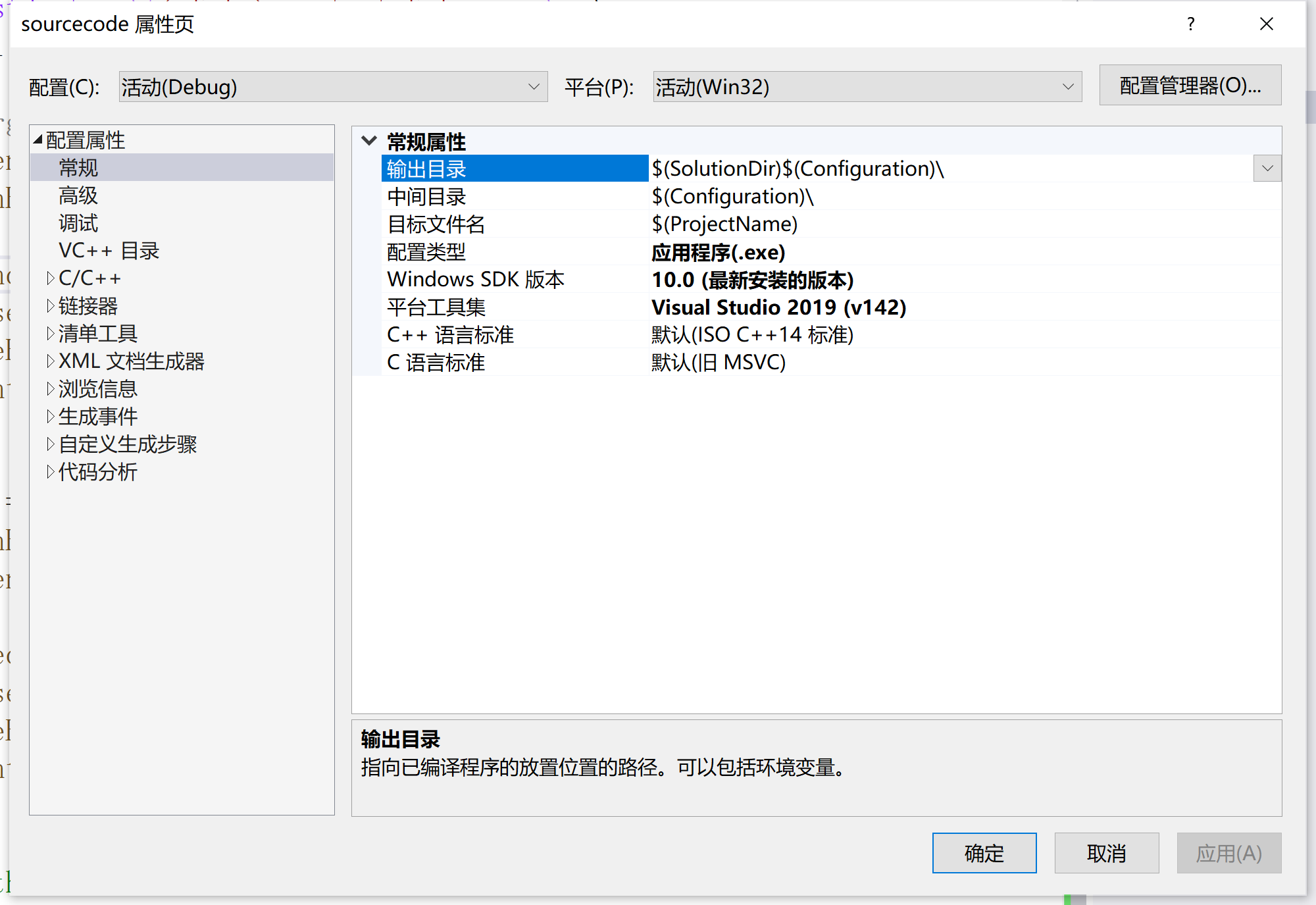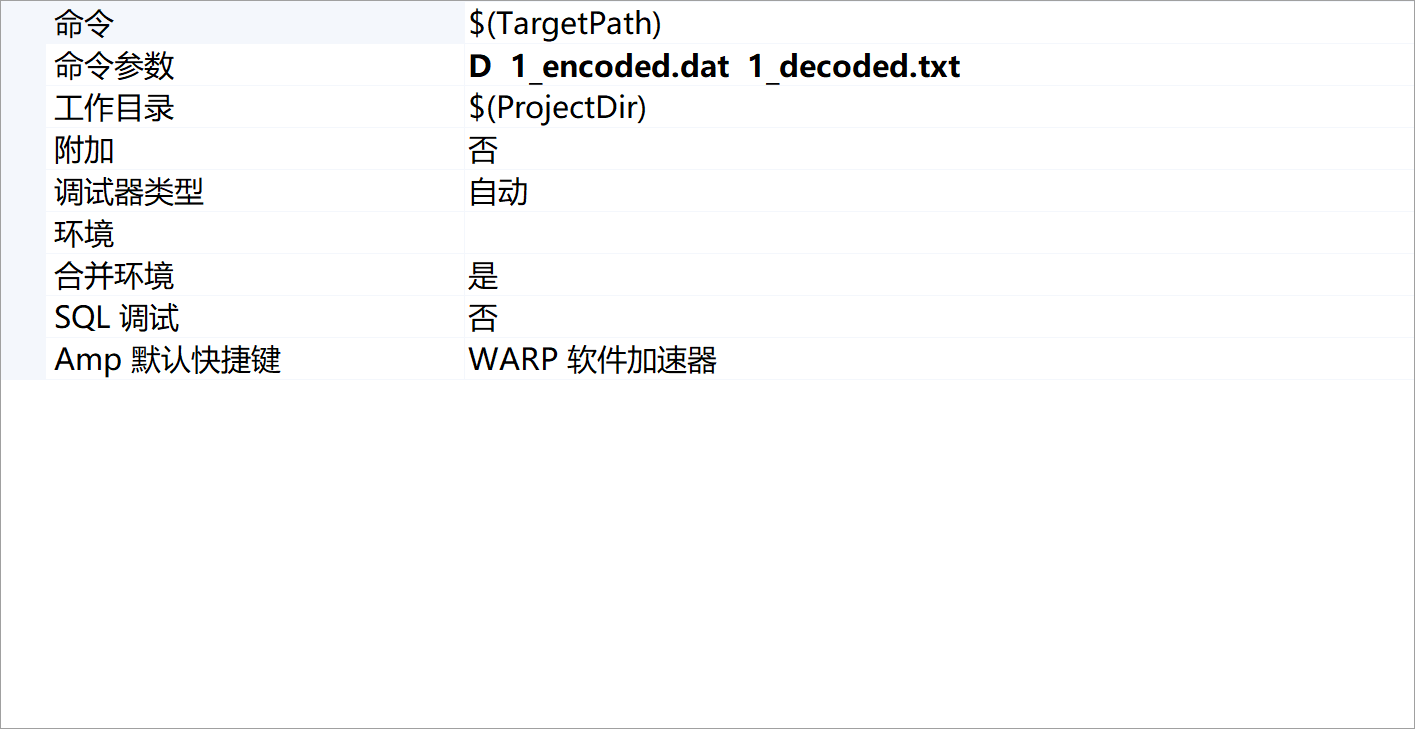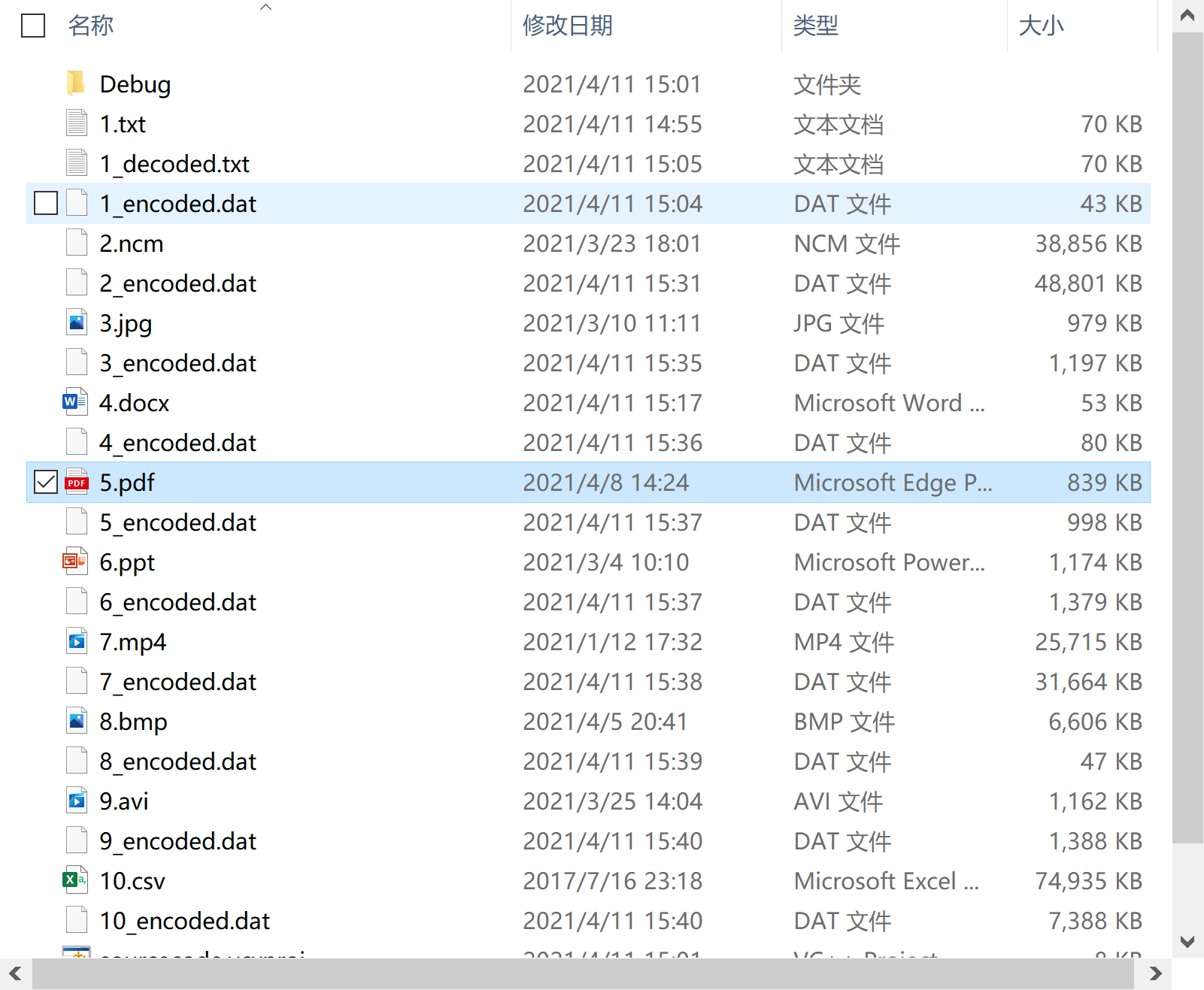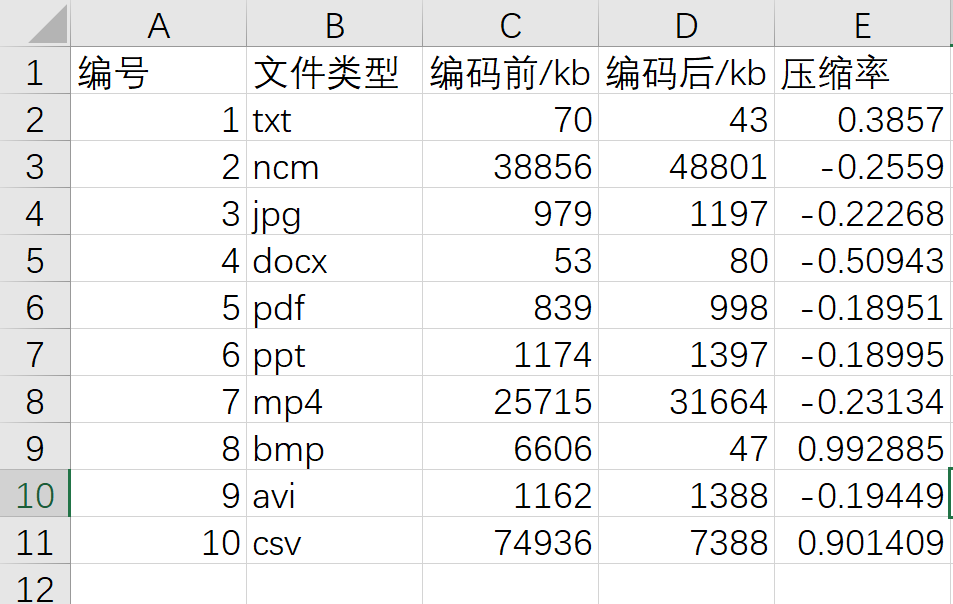I Experimental purpose
Master the basic principle of dictionary coding, program LZW decoder with C/C++/Python and other languages, and analyze the encoding and decoding algorithm.
II Relevant knowledge
1. LZW coding principle and implementation algorithm
LZW's coding idea is to constantly extract new strings from the character stream, which is popularly understood as new "entries", and then use "code" that is, codewords to represent this "entry". In this way, the encoding of the character stream becomes to replace the character stream with a codeword to generate a codeword stream, so as to achieve the purpose of compressing data. LZW coding is done around a conversion table called a dictionary. LZW encoder completes the conversion between input and output by managing this dictionary. The input of LZW encoder is a character stream, which can be a string composed of 8-bit ASCII characters, and the output is a codeword stream represented by n bits (e.g. 12 bits).
2. Steps of LZW coding algorithm
Step 1: initialize the dictionary to include all possible single characters, and initialize the current prefix P to null.
Step 2: the current character C = the next character in the character stream.
Step 3: judge whether P + C is in the dictionary
(1) If "yes", expand P with C, that is, let P=P + C, and return to step 2.
(2) If "no", the codeword W corresponding to the current prefix P is output;
Add P + C to the dictionary;
Let P=C and return to step 2
LZW coding algorithm can be realized by the following functions. First initialize the dictionary, then read the characters from the file to be compressed in sequence, and perform coding according to the above algorithm. Finally, the codeword stream is output to the file.
3. LZW decoding principle and implementation algorithm
At the beginning of LZW decoding algorithm, the decoding dictionary is the same as the encoding dictionary, including all possible prefix roots. Concrete solution
The coding algorithm is as follows:
Step 1: at the beginning of decoding, the dictionary contains all possible prefix roots. three
Step 2: make CW: = the first codeword in the codeword stream.
Step 3: output the current suffix string CW to codeword stream.
Step 4: Previous codeword PW: = current codeword CW.
Step 5: current codeword CW: = next codeword of codeword stream.
Step 6: determine the prefix string Whether CW is in the dictionary.
(1) If "yes", the prefix string string CW output to character stream.
Current prefix P: = prefix string first PW.
Current character C: = current prefix string The first character of CW.
Add the suffix string P+C to the dictionary.
(2) If "no", the current prefix P: = prefix string first PW.
Current character C: = prefix string The first character of CW.
Output the suffix string P+C to the character stream, and then add it to the dictionary.
Step 7: judge whether there are still codewords to be translated in the codeword stream.
(1) If "yes", return to step 4.
(2) If "no", end.
LZW decoding algorithm can be realized by the following functions. First initialize the dictionary, and then read the code from the compressed file in sequence
Word and decode according to the above algorithm. Finally, the solved string is output to the file.
III Experimental steps
1. First debug the LZW encoding program, take a text file as the input, and get the output LZW encoding file.
2. Take the encoding file obtained in experimental step 1 as the input, and write the decoding program of LZW. When writing decoding program
Note the key statements and explain what to do. The experimental report focuses on the current codeword in the dictionary
How to deal with and explain the reason when it does not exist.
3. Select at least ten different format types of files and use LZW encoder to compress to obtain the output compressed bits
Stream file. Analyze the compression efficiency of files in different formats.
IV Experimental code
bitio.h
/*
* Declaration for bitwise IO
*
* vim: ts=4 sw=4 cindent
*/
#ifndef __BITIO__
#define __BITIO__
#include <stdio.h>
typedef struct{
FILE *fp;
unsigned char mask;
int rack;
}BITFILE;
BITFILE *OpenBitFileInput( char *filename);
BITFILE *OpenBitFileOutput( char *filename);
void CloseBitFileInput( BITFILE *bf);
void CloseBitFileOutput( BITFILE *bf);
int BitInput( BITFILE *bf);
unsigned long BitsInput( BITFILE *bf, int count);
void BitOutput( BITFILE *bf, int bit);
void BitsOutput( BITFILE *bf, unsigned long code, int count);
#endif // __BITIO__
bitio.c
/*
* Definitions for bitwise IO
*
* vim: ts=4 sw=4 cindent
*/
#include <stdlib.h>
#include <stdio.h>
#include "bitio.h"
BITFILE* OpenBitFileInput(char* filename) {
BITFILE* bf;
bf = (BITFILE*)malloc(sizeof(BITFILE));
if (NULL == bf) return NULL;
if (NULL == filename) bf->fp = stdin;
else bf->fp = fopen(filename, "rb");
if (NULL == bf->fp) return NULL;
bf->mask = 0x80;
bf->rack = 0;
return bf;
}
BITFILE* OpenBitFileOutput(char* filename) {
BITFILE* bf;
bf = (BITFILE*)malloc(sizeof(BITFILE));
if (NULL == bf) return NULL;
if (NULL == filename) bf->fp = stdout;
else bf->fp = fopen(filename, "wb");
if (NULL == bf->fp) return NULL;
bf->mask = 0x80;
bf->rack = 0;
return bf;
}
void CloseBitFileInput(BITFILE* bf) {
fclose(bf->fp);
free(bf);
}
void CloseBitFileOutput(BITFILE* bf) {
// Output the remaining bits
if (0x80 != bf->mask) fputc(bf->rack, bf->fp);
fclose(bf->fp);
free(bf);
}
int BitInput(BITFILE* bf) {
int value;
if (0x80 == bf->mask) {
bf->rack = fgetc(bf->fp);
if (EOF == bf->rack) {
fprintf(stderr, "Read after the end of file reached\n");
exit(-1);
}
}
value = bf->mask & bf->rack;
bf->mask >>= 1;
if (0 == bf->mask) bf->mask = 0x80;
return((0 == value) ? 0 : 1);
}
unsigned long BitsInput(BITFILE* bf, int count) {
unsigned long mask;
unsigned long value;
mask = 1L << (count - 1);
value = 0L;
while (0 != mask) {
if (1 == BitInput(bf))
value |= mask;
mask >>= 1;
}
return value;
}
void BitOutput(BITFILE* bf, int bit) {
if (0 != bit) bf->rack |= bf->mask;
bf->mask >>= 1;
if (0 == bf->mask) { // eight bits in rack
fputc(bf->rack, bf->fp);
bf->rack = 0;
bf->mask = 0x80;
}
}
void BitsOutput(BITFILE* bf, unsigned long code, int count) {
unsigned long mask;
mask = 1L << (count - 1);
while (0 != mask) {
BitOutput(bf, (int)(0 == (code & mask) ? 0 : 1));
mask >>= 1;
}
}
#if 0
int main(int argc, char** argv) {
BITFILE* bfi, * bfo;
int bit;
int count = 0;
if (1 < argc) {
if (NULL == OpenBitFileInput(bfi, argv[1])) {
fprintf(stderr, "fail open the file\n");
return -1;
}
}
else {
if (NULL == OpenBitFileInput(bfi, NULL)) {
fprintf(stderr, "fail open stdin\n");
return -2;
}
}
if (2 < argc) {
if (NULL == OpenBitFileOutput(bfo, argv[2])) {
fprintf(stderr, "fail open file for output\n");
return -3;
}
}
else {
if (NULL == OpenBitFileOutput(bfo, NULL)) {
fprintf(stderr, "fail open stdout\n");
return -4;
}
}
while (1) {
bit = BitInput(bfi);
fprintf(stderr, "%d", bit);
count++;
if (0 == (count & 7))fprintf(stderr, " ");
BitOutput(bfo, bit);
}
return 0;
}
#endif
lzw_E.c
* Definition for LZW coding
*
* vim: ts=4 sw=4 cindent nowrap
*/
#include <stdlib.h>
#include <stdio.h>
#include "bitio.h"
#define MAX_CODE 65535
struct {
int suffix;
int parent, firstchild, nextsibling;
} dictionary[MAX_CODE + 1];
int next_code;
int d_stack[MAX_CODE]; // stack for decoding a phrase
#define input(f) ((int)BitsInput( f, 16))
#define output(f, x) BitsOutput( f, (unsigned long)(x), 16)
int DecodeString(int start, int code);
void InitDictionary(void);
void PrintDictionary(void) {
int n;
int count;
for (n = 256; n < next_code; n++) {
count = DecodeString(0, n);
printf("%4d->", n);
while (0 < count--) printf("%c", (char)(d_stack[count]));
printf("\n");
}
}
int DecodeString(int start, int code) {
int count;
count = start;
while (0 <= code) {
d_stack[count] = dictionary[code].suffix;
code = dictionary[code].parent;
count++;
}
return count;
}
void InitDictionary(void) {
int i;
for (i = 0; i < 256; i++) {
dictionary[i].suffix = i;
dictionary[i].parent = -1;
dictionary[i].firstchild = -1;
dictionary[i].nextsibling = i + 1;
}
dictionary[255].nextsibling = -1;
next_code = 256;
}
/*
* Input: string represented by string_code in dictionary,
* Output: the index of character+string in the dictionary
* index = -1 if not found
*/
int InDictionary(int character, int string_code) {
int sibling;
if (0 > string_code) return character;
sibling = dictionary[string_code].firstchild;
while (-1 < sibling) {
if (character == dictionary[sibling].suffix) return sibling;
sibling = dictionary[sibling].nextsibling;
}
return -1;
}
void AddToDictionary(int character, int string_code) {
int firstsibling, nextsibling;
if (0 > string_code) return;
dictionary[next_code].suffix = character;
dictionary[next_code].parent = string_code;
dictionary[next_code].nextsibling = -1;
dictionary[next_code].firstchild = -1;
firstsibling = dictionary[string_code].firstchild;
if (-1 < firstsibling) { // the parent has child
nextsibling = firstsibling;
while (-1 < dictionary[nextsibling].nextsibling)
nextsibling = dictionary[nextsibling].nextsibling;
dictionary[nextsibling].nextsibling = next_code;
}
else {// no child before, modify it to be the first
dictionary[string_code].firstchild = next_code;
}
next_code++;
}
void LZWEncode(FILE* fp, BITFILE* bf) {
int character;
int string_code;
int index;
unsigned long file_length;
fseek(fp, 0, SEEK_END);
file_length = ftell(fp);
fseek(fp, 0, SEEK_SET);
BitsOutput(bf, file_length, 4 * 8);
InitDictionary();
string_code = -1;
while (EOF != (character = fgetc(fp))) {
index = InDictionary(character, string_code);
if (0 <= index) { // string+character in dictionary
string_code = index;
}
else { // string+character not in dictionary
output(bf, string_code);
if (MAX_CODE > next_code) { // free space in dictionary
// add string+character to dictionary
AddToDictionary(character, string_code);
}
string_code = character;
}
}
output(bf, string_code);
}
void LZWDecode(BITFILE* bf, FILE* fp) {
int character;
int new_code, last_code;
int phrase_length;
unsigned long file_length;
file_length = BitsInput(bf, 4 * 8);
if (-1 == file_length) file_length = 0;
InitDictionary();
last_code = -1;
while (0 < file_length) {
new_code = input(bf);
if (new_code >= next_code) { // this is the case CSCSC( not in dict)
d_stack[0] = character;
phrase_length = DecodeString(1, last_code);
}
else
{
phrase_length = DecodeString(0, new_code);
}
character = d_stack[phrase_length - 1];
while (0 < phrase_length)
{
phrase_length--;
fputc(d_stack[phrase_length], fp);
file_length--;
}
if (MAX_CODE > next_code)
{// add the new phrase to dictionary
AddToDictionary(character, last_code);
}
last_code = new_code;
}
}
int main(int argc, char** argv) {
FILE* fp;
BITFILE* bf;
if (4 > argc) {
fprintf(stdout, "usage: \n%s <o> <ifile> <ofile>\n", argv[0]);
fprintf(stdout, "\t<o>: E or D reffers encode or decode\n");
fprintf(stdout, "\t<ifile>: input file name\n");
fprintf(stdout, "\t<ofile>: output file name\n");
return -1;
}
if ('E' == argv[1][0]) { // do encoding
fp = fopen(argv[2], "rb");
bf = OpenBitFileOutput(argv[3]);
if (NULL != fp && NULL != bf) {
LZWEncode(fp, bf);
fclose(fp);
CloseBitFileOutput(bf);
fprintf(stdout, "encoding done\n");
}
}
else if ('D' == argv[1][0]) { // do decoding
bf = OpenBitFileInput(argv[2]);
fp = fopen(argv[3], "wb");
if (NULL != fp && NULL != bf) {
LZWDecode(bf, fp);
fclose(fp);
CloseBitFileInput(bf);
fprintf(stdout, "decoding done\n");
}
}
else { // otherwise
fprintf(stderr, "not supported operation\n");
}
//system("pause");
return 0;
}
V experimental result
Single file conversion steps and results



Compression efficiency analysis of ten different types of files
Experimental result diagram

Analysis of experimental results
